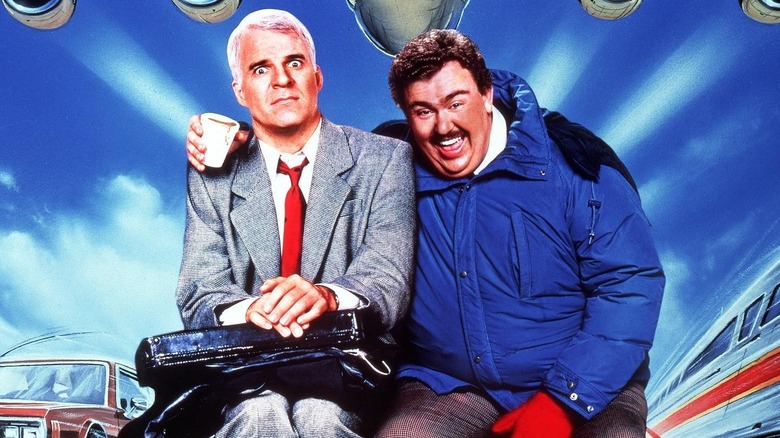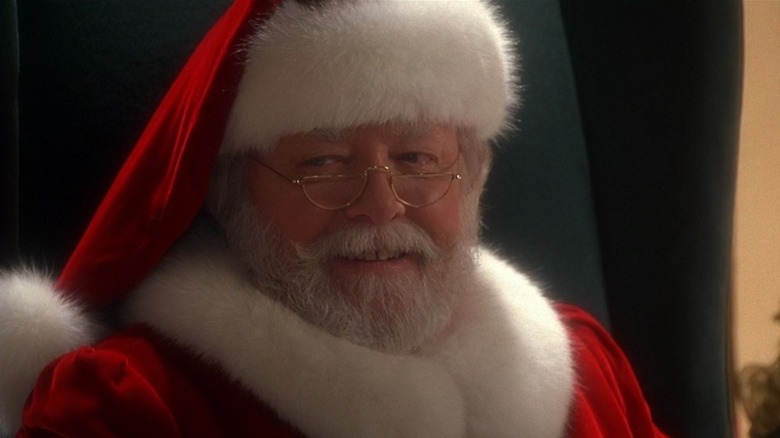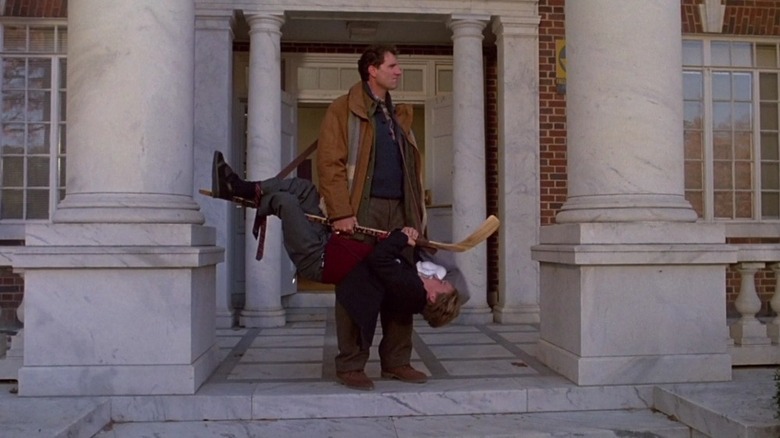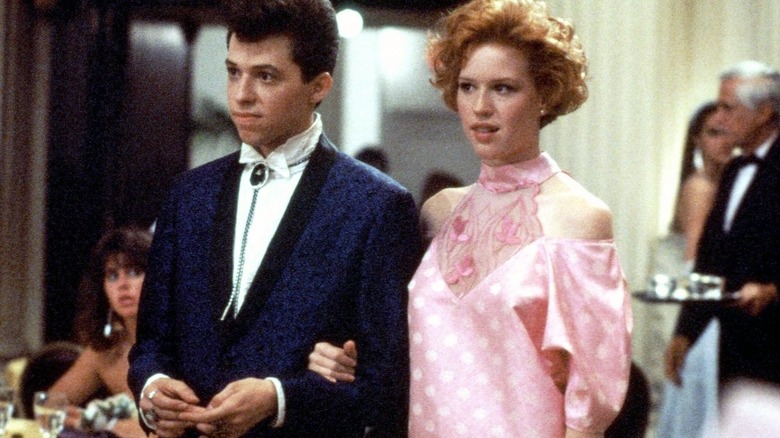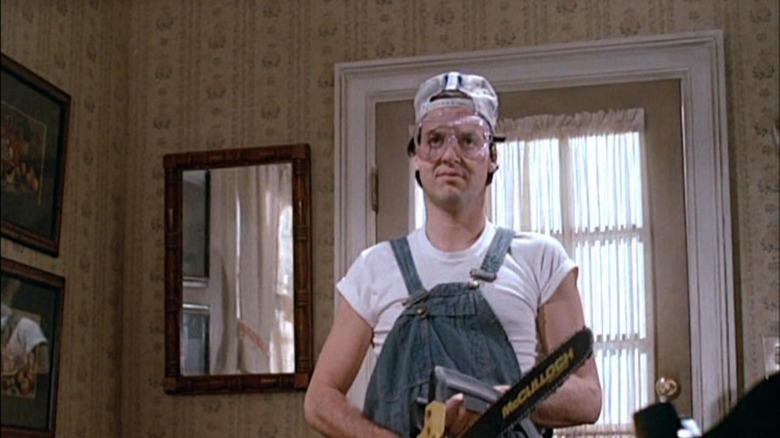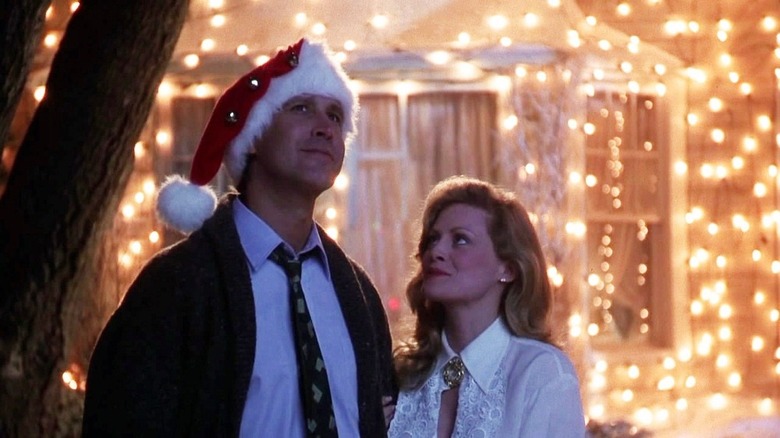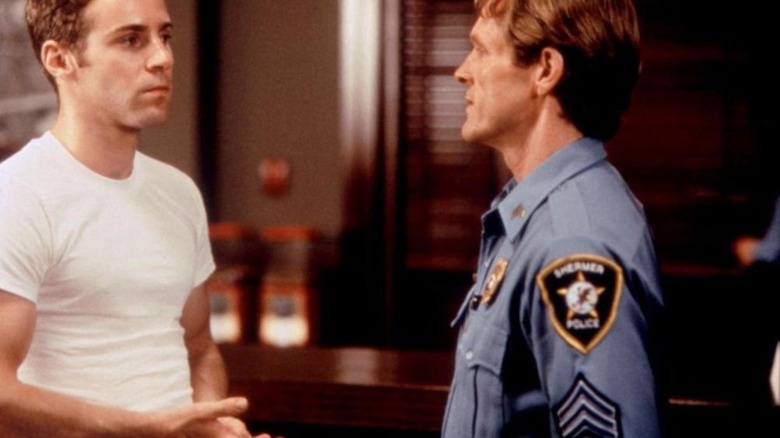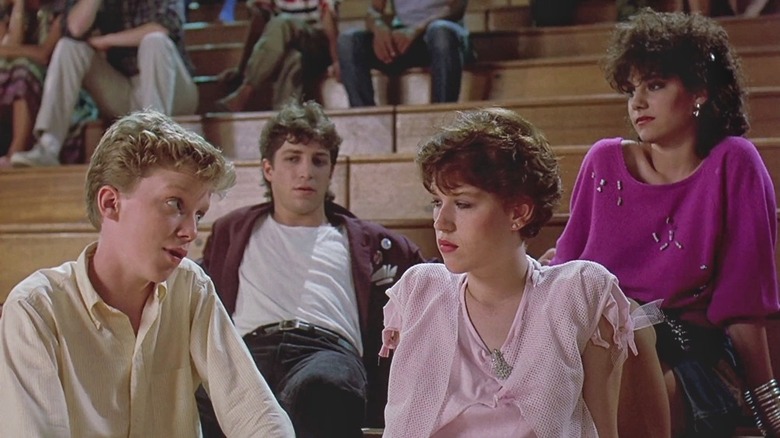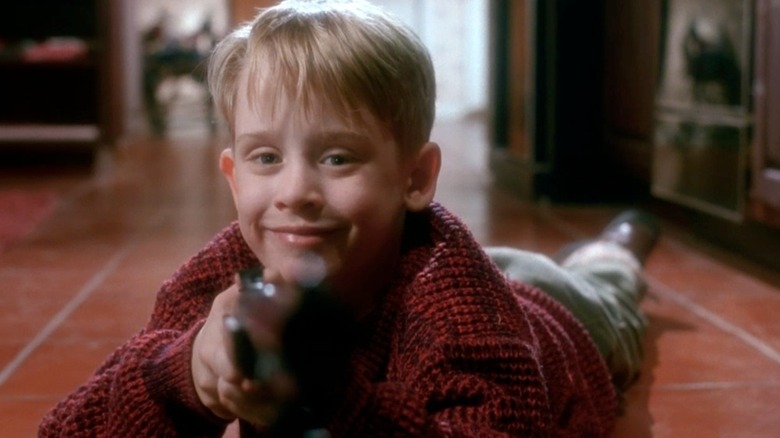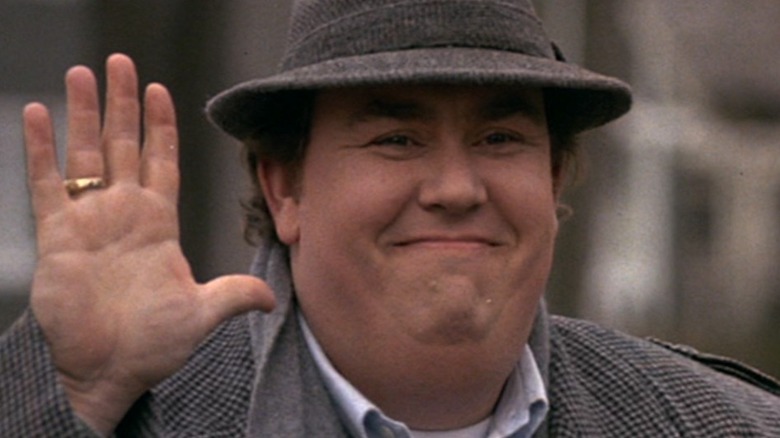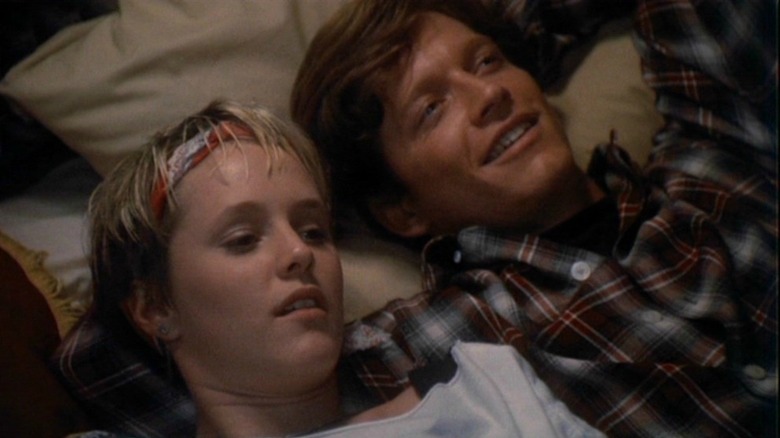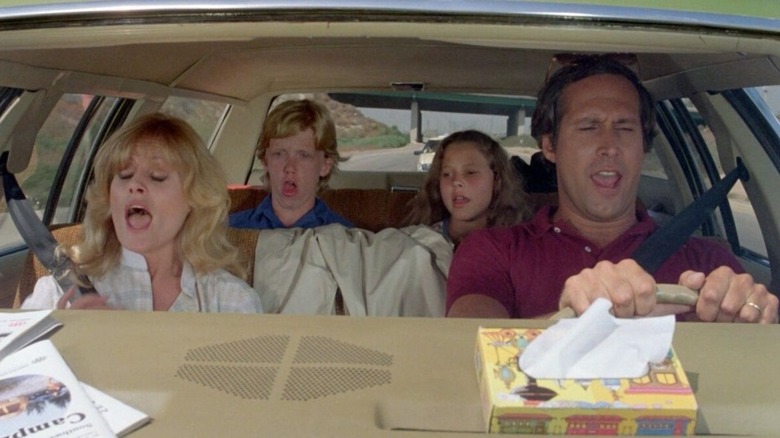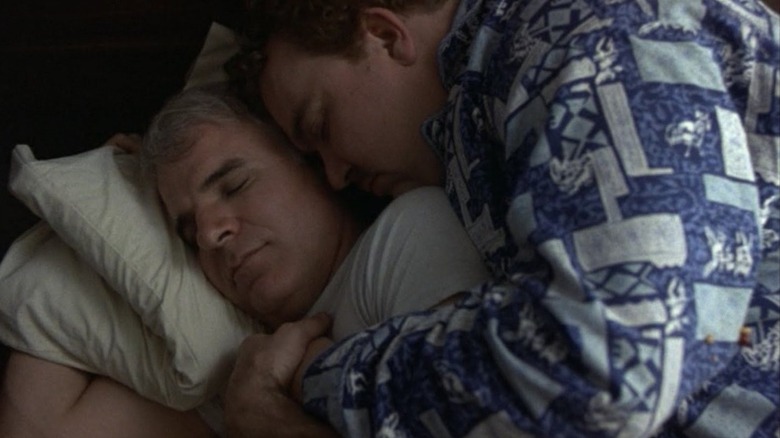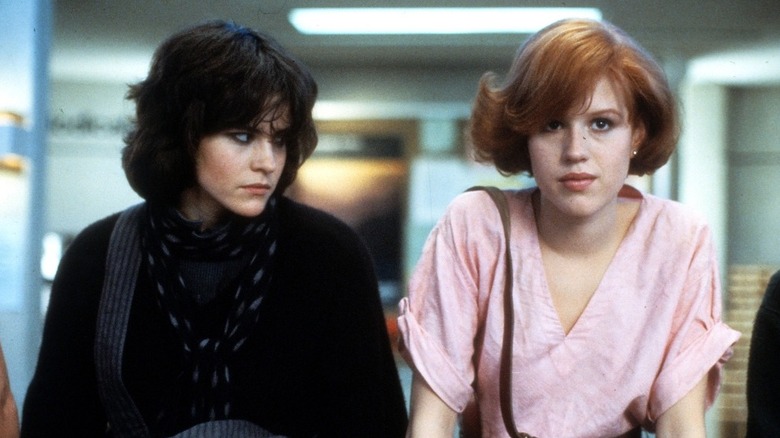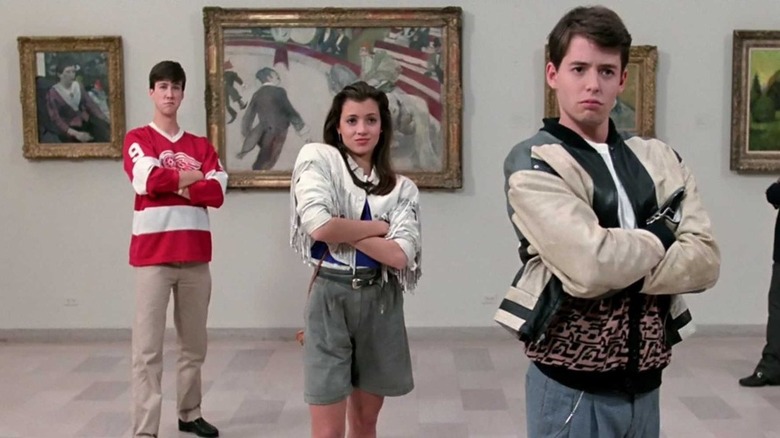The 14 Best John Hughes Films Ranked
John Hughes passed away in 2009 at 59 years of age, but his legacy as a filmmaker continues. Sequels to some of his biggest hits are still being produced (including 2015's "Vacation" and this year's "Home Sweet Home Alone"), and the affection so many of us feel towards his earlier movies is unlikely to fade anytime soon. He only directed eight feature films during his career, but he wrote more than three times that number. The odds are good that you love one or more of his movies, and you're not alone in that feeling — unless the one you love is "Drillbit Taylor," in which case you're absolutely on your own.
In highlighting his best films, we decided to consider his work both as a director and writer as it both broadens the pool of possibilities and lets us cover more than just his eight directorial efforts. We've ranked 14 of his movies below, ostensibly from worst to best, but I'd argue they're all good to great examples of the man's talents. Did your own favorite make the cut on our list of John Hughes movies? Probably — unless your favorite is "Curly Sue," in which case: What is your deal, anyway?
14. Miracle on 34th Street (1994, writer)
A young girl who doesn't believe in Santa Claus. A single mom struggling to balance work at a department store and time with her daughter. A man who loves them both. What do they all have in common this Christmas? A hobo who claims he's actually the Kris Kringle.
Here's the thing. While this John Hughes-scripted remake can't touch the magical atmosphere of the 1947 original, there's still something a bit irresistible about its spirited premise and naively optimistic views on life, love, and the legal system. The real world would chew up and spit out every one of these simpletons in a bloody heartbeat, but as a modern-day fantasy, Les Mayfield's film works well enough to tweak the holiday feels and put viewers in a charitable mood.
Mara Wilson is a delight, and '90s stalwarts Elizabeth Perkins and Dylan McDermott are perfectly solid as the adults in the room. Richard Attenborough, meanwhile, makes for a fun Santa suggesting that Christmas spirit, like life itself, always finds a way.
13. Dutch (1991, writer)
An average Joe tries to impress his girlfriend by volunteering to spend the upcoming holiday with her son, but the two mix like oil and sparkling water. The man is a grump, the boy is a snob, but this might just be their best Thanksgiving ever.
The '80s showed that John Hughes knows both comedy and teens, but his skills wavered a bit with this early '90s entry from director Peter Faiman. The physical violence of the previous year's "Home Alone" doesn't quite translate with an older child trading hits with an adult, and a bit too much of the comedy relies on antagonism.
That said, "Dutch" recovers by the end thanks to the warmth of the writing and the two lead performances. Ed O'Neill plays Dutch, Ethan Embry plays the boy, Doyle, and both walk a fine line between the obnoxious and the heartwarming. Thanksgiving films are about family, and this one shows that it doesn't always refer to the ones you're born into.
12. Pretty in Pink (1986, writer)
Andie is the daughter of a blue-collar single dad, and she can't help but dream about life on the right side of the tracks. The odds are against her when she falls for a dreamy teen who comes from wealth and privilege, but she trudges forward with a sewing machine in one hand and her best male friend in the other.
The '80s were a wild time for numerous reasons, but one historical moment that stands out is when test audiences literally booed the original ending to "Pretty in Pink," which saw Andie choose Duckie. They instead wanted her to end up with a guy named Blane. Blane! The ending was reshot, the film was a success, and the rest is history, but even watching through today's eyes it's clear that Blane (Blane!) is not the boy for her. Okay fine, I'll move on.
That terrible, misguided ending aside, there's plenty to enjoy in Howard Deutch's film, including memorable performances by Molly Ringwald, Andrew McCarthy (Blane!), Jon Cryer, James Spader, and the late, great Harry Dean Stanton.
11. Mr. Mom (1983, writer)
Jack is a happily married father of three, but his life gets shaken up when he loses his job as the family's breadwinner. His wife Caroline goes back to work and finds success, while Jack struggles to carry the workload of a stay-at-home parent.
Like "Pretty in Pink," this is another John Hughes script that delivers laughs and warmth only to drop the ball somewhat at the ending — sexism ultimately drives Caroline to quit despite her success, while Jack finds redemption and secures his old job again. Hooray for the status quo of the woman belonging at home! Getting there, though, is a good, silly time as Michael Keaton shines under the circumstances with some stellar physical comedy and line delivery.
The eternally fantastic Teri Garr and Martin Mull join in on the fun, and while much of the comedy (outside of Keaton's performance) is built on gender stereotypes, the combined talents work to elevate the material into the realm of the legitimately funny and memorable.
10. National Lampoon's Christmas Vacation (1989, writer)
The Griswold family knows that family vacations can be a hellscape, what with car troubles and kids who look mysteriously different from one trip to the next, so this Christmas they've decided to stay home to celebrate the holiday. This being the Griswolds, though, it's still going to be a chaotic vacation to remember.
It's probably evident, given where it lands in this ranking, but "Christmas Vacation" is not a holiday comedy I hold close to my heart. I know, you all love it, and I'm happy for you, but the film ramps up the stupidity and inconsistently funny slapstick so far that the eventual pivot to emotional beats lands like fish guts on the pavement. Director Jeremiah Chechik seems uninterested in corralling the chaos, making a film that feels more like a series of bits and pieces and competing personalities.
Of course, it's to the credit of those personalities that they still deliver numerous one-offs that bring enough of the funny to make this an entertaining watch despite itself. Chevy Chase headlines in full-on idiot mode, and finds support from Beverly D'Angelo, Doris Roberts, Julia Louis-Dreyfus, and Randy Quaid. It's a romp!
9. Reach the Rock (1998, writer)
Robin is a troubled young man who left town for good reason, and when he returns it's with a chaotic and unsettled energy. He quickly lands in jail where he comes face to face with a local cop hanging on to his own simmering anger.
The most atypical movie in John Hughes' filmography, this mildly comedic drama has been seen by few and is liked by even fewer. I get it, I do, but it's a film where even the wobbly parts of Hughes' script come alive thanks to the performances. That's not to imply it's a fast-moving or necessarily energetic movie, but dialogue and interactions work to craft a story about frustration, regret, and the all-too-human habit of needing to blame someone for life's miseries.
Alessandro Nivola plays Robin with a mix of brooding intensity and self-doubt, and the great William Sadler plays the cop whose grudge against the young man speaks volumes about his own inability to move on. Two minor threads involving thwarted romances are harmless filler, but the meat of the film is the two men in mental and emotional combat over a war neither needs to be fighting.
8. Sixteen Candles (1984, writer/director)
Sam is excited for her 16th birthday, but the anticipation fades when she realizes her preoccupied family has completely forgotten about it. Now, the only thing helping power her through the day is an unrequited crush on the most popular boy in school — and it might not be unrequited for long.
First things first, there are absolutely some abhorrent elements to this script. From iffy sexual politics only just skirting the line of date rape to an Asian character whose entire existence is built on racial humor, "Sixteen Candles" is a quintessential '80s comedy. The latter is arguably debatable — Roger Ebert felt Gedde Watanabe succeeded at turning the character of Long Duk Dong into "high comedy" — but it's difficult to see the former as anything but poorly thought-out writing.
Both elements are minor players here, though, leaving the bulk of the film to play around with laughs stemming from inappropriate older relatives, nerds with a dream, and an increasingly embarrassed Molly Ringwald. Add in Anthony Michael Hall, Paul Dooley, and brief appearances by John Cusack, Joan Cusack, and Jami Gertz, and you have a silly, sweet film about the consistent inconsistencies of family.
7. Home Alone (1990, writer)
A selfish, inconsiderate family forgets one of their own at home when they jet off to Europe, but the boy's worry quickly turns to delight. Like Burgess Meredith in a "Twilight Zone" episode, he's thrilled to be all alone ... until a pair of dim-witted thieves come knocking at his door.
"Home Alone" famously made a star of Macaulay Culkin, but it arguably offered an even bigger boon to director Chris Columbus. He was originally set to direct "Christmas Vacation," but despite being in real need of the work he quit because Chevy Chase was too much of a jerk. Hughes gave him this script as a way of apology, and everyone walked away happy. Audiences, too, were thrilled as the movie riffs smartly on home invasion themes with all the sensibilities of an eight-year-old kid.
Yes, the violence is to the level of live-action Looney Tunes, but it's the little boy's adventure — it may not be his literal POV, but it's as close as it can be to seeing the family, the bad guys, and the circumstances through his eyes. It speaks to the discordant wants and desires of children, a reminder to be careful what you wish for, and the importance of family. And it's a far better holiday comedy than "Christmas Vacation," too...
6. Uncle Buck (1989, writer/director)
Buck Russell isn't a man who craves stability, but his quest for the next best thing is sidelined when he's tasked with watching his sister's children while her father recuperates from an illness. Taking care of children might just be the kick that helps Buck finally grow up.
A year before Macaulay Culkin would become a household name, the expressive little towhead co-starred as just one of the many delights in "Uncle Buck." Gaby Hoffman and Jean Louisa Kelly round out the three kids who amuse, frustrate, and ultimately help redeem John Candy's Buck, and their journey is filled with big laughs, bigger pancakes, and heapings of heart for everyone involved (Well, everyone but the teenage daughter's sketchy boyfriend, Bug, who gets a serving of justice instead). Buck also sets an assistant principal straight, and it's these kinds of moments in defense of the children that bring on cheers. John Hughes and John Candy are just as successful at bringing the heart, with the comedic actor channeling an engaging blend of anger, hope, and love.
5. Some Kind of Wonderful (1987, writer)
Keith is the son of blue-collar parents, and he can't help but dream about life on the right side of the tracks. The odds are against him when he falls for a dreamy teen who comes from wealth and privilege, but he trudges forward with mechanic overalls in one hand and his best female friend in the other.
Does that synopsis sound familiar? It should, seeing as I basically copied the "Pretty in Pink" synopsis from above just as John Hughes copied his own "Pretty in Pink" script. That's not a complaint, by the way, as "Some Kind of Wonderful" fixes what's wrong with the earlier film in the form of a far more satisfying ending. Eric Stoltz takes the lead here as a teen pining for Lea Thompson when a tomboyish Mary Stuart Masterson is right there in front of him.
We still get humor, heart, and some class commentary along the way, but the film's core strength — in addition to its ending — is that both relationship possibilities are convincing. We can see and understand Keith's attraction to both girls, and theirs to him, and the ending's more affecting for it.
4. National Lampoon's Vacation (1983, writer)
Before the Griswold family visited Europe, Las Vegas, or Christmas Day, they went on a cross-country road trip to Walley World. The vacation didn't quite go as planned.
This ridiculously funny tale sees a family discovering America while on the most ill-planned cross-country journey since the Donner Party. While later sequels dumbed him down immensely, Chevy Chase's Clark Griswold is a far more believable and therefore empathetic character here. His blind optimism and desire for a good time quite often supersede his common sense, and the result is a great time for everyone but the Griswolds.
Beverly D'Angelo, Anthony Michael Hall, and Dana Barron make up the immediate family, and their interactions are humorously exaggerated reminders of time spent with our own families. John Hughes' script, based on his own short story, finds a comedically-minded director in Harold Ramis who does great work crafting set pieces and delivering a pitch-perfect pace. It's an endlessly silly movie, albeit one grounded somewhat in reality, but even here Hughes' affection for family shines through.
3. Planes, Trains & Automobiles (1987, writer/director)
A businessman struggling to get home to his family for Thanksgiving hits every speed bump and obstacle along the way. His bad luck continues when he finds himself needing the help of an overly-friendly salesman whose own luck seems even worse.
If you've read through this whole list (or have simply seen the bulk of John Hughes' films) you know that while comedy is typically the primary focus of his movies, the core themes typically revolve around family — both by blood and by choice. They often deliver emotional beats, but few if any pack the punch of "Planes, Trains & Automobiles". Steve Martin and John Candy star as the uptight businessman and the goofball, respectively, and their comedic pairing is as beautifully balanced as any you're likely to find as they banter, bicker, and share pillows (whether Will Smith and Kevin Hart can reach those same dizzying heights remains to be seen).
The film absolutely nails both the frustrations of human interaction and the need for it, and it drives home the importance of being with loved ones when you need them most (and helping others do the same). If you're not crying by the end of this one, my friend, you are a heartless knob. Sorry, I don't make the rules.
2. The Breakfast Club (1985, writer/director)
A brain, an athlete, a basket case, a princess, and a criminal are brought together for a full day of detention on a Saturday. They arrive as strangers, but by the time they leave it will be as people who know each other — and themselves — far better than anyone else in their lives.
Some of you undoubtedly think "The Breakfast Club" deserves the top spot on a list of the best John Hughes films, and I can't argue with that. Hit me on a different day, and I might agree. It's a brilliantly constructed look at stock characters, the stereotypes we all knew from high school, and how those empty labels do far more harm than good. It's human nature to put ourselves and others in boxes, but while it makes things simpler on the surface, it has a tendency to obfuscate rather than illuminate. That's a heady way of saying this comedic drama is as insightful as it is entertaining.
Anthony Michael Hall, Emilio Estevez, Ally Sheedy, Molly Ringwald, and Judd Nelson shine as teens coming to understand themselves and their place in the world, and that awakening comes with humor, pain, and a badass vice principal whose "You mess with the bull, you get the horns" became an instantly iconic line. We were these teens — hell, some of us are still those "teens" in our quieter, darker, or more hopeful moments.
1. Ferris Bueller's Day Off (1986, writer/director)
A teen named Ferris decides a skip day is in order mere weeks before his high school graduation, and with both his best friend and his girlfriend in tow, he heads out for a full day of fun in Chicago. It's the good time he's hoping for, but the trio also finds so much more.
Several of John Hughes' films are eminently rewatchable, but "Ferris Bueller's Day Off" is the one I can't turn off once started. Hughes' script is as zippy as it is insightful, as ridiculous as it is affecting, and Ferris' seemingly charmed life is an addictive pleasure. It takes a beat for his sister to accept that, to learn not to begrudge other people their successes, and it's just one of the film's nuggets of simple wisdom. Be sure to stop and smell the roses, never pass up the opportunity to lipsync Wayne Newton, cardio can save your bacon someday, running a car in reverse rolls back the mileage ... okay, that last one's not true, but it's a terrific moment both for the drama that follows and because it's a reminder that even someone as savvy and well put together as Ferris doesn't actually know everything.
Matthew Broderick slays as Ferris, and the supporting cast gathered around him is pure delight including Mia Sara, Alan Ruck, Jennifer Grey, Edie McClurg, and more. There are just so many great sequences here, from the parking garage attendants joyriding through the city to the heartbreak in the museum to Ferris' desperate run through backyards to get home before his parents. "Ferris Bueller's Day Off" is a flat-out comedy masterpiece, and there's really nothing else to add.
